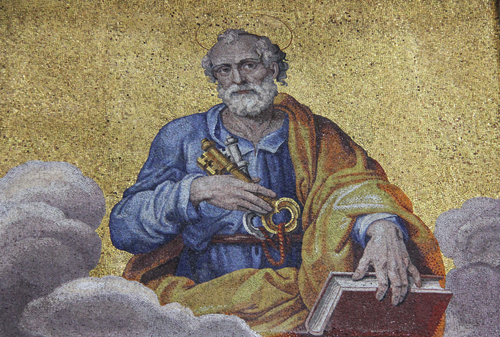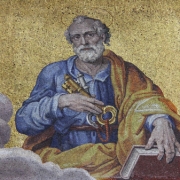Petrus erzählt von Jesus
/0 Comments/in Wöchentliche Andacht/by David GuzikIhr Männer von Israel, hört diese Worte: Jesus, der Nazarener, einen Mann, der von Gott euch gegenüber beglaubigt wurde durch Kräfte und Wunder und Zeichen, die Gott durch ihn in eurer Mitte wirkte, wie ihr auch selbst wißt. (Apostelgeschichte 2,22)
Als Petrus zu der großen Menge in Jerusalem an Pfingsten predigte, erklärte er ihnen, dass die seltsamen Dinge, wie die Feuerzungen und das Geräusch, Beweise für das Ausgiessen des Heiligen Geistes waren. Er führte dazu einige Bibelstellen an.

Das war bemerkenswert. Was tat Petrus bei der Ausgiessung des Heiligen Geistes, als Zeichen und Wunder und Zungenrede geschahen? Im Grunde genommen sagte er: „Lasst uns die Bibel nehmen und schauen, was in Joel steht.“ In seiner Predigt in Apostelgeschichte zitiert Petrus drei verschiedene Stellen des Alten Testaments: Joel 2, 28-32; Psalm 16,8-11 und Psalm 110,1.
Der Fokus auf Gottes Wort unterdrückte das Wirken des Heiligen Geistes nicht; sondern er erfüllte das, was der Heilige Geist tun wollte. Alle Zeichen und Wunder und die Zungenrede waren eine Vorbereitung auf dieses Werk von Gottes Wort.
Leider scheinen manche Menschen Gottes Wort gegen das Werk des Heiligen Geistes zu stellen. Sie glauben fast, es sei geistlicher, wenn dabei kein Bibellesen stattfindet.
Doch als Petrus die Erklärung von Joel 2 beendetet hatte, war er nicht fertig mit seiner Predigt. Er sagte zu der Menge: Ihr Männer von Israel, hört diese Worte. Viele Menschen würde glauben, es sei genug gewesen, als Petrus die Stelle in Joel zitierte, wenn man bedenkt, was sie alles beinhaltet. Joel erzählt uns von:
-
einer Ausgiessung des Heiligen Geistes (Apostelgeschichte 2,17)
-
wundersamen Träumen, Visionen und Prophezeiungen (Apostelgeschichte 2,17-18)
-
Zeichen und Wundern in Bezug auf den Tag des Herrn (Apostelgeschichte 2,19-20)
-
einer Einladung, den Namen des Herrn anzurufen und gerettet zu werden (Apostelgeschichte 2,21)
So großartig wie diese Dinge auch waren, es war nicht genug, denn Petrus hatte noch nicht über das rettenden Werk Jesu gesprochen. Bis zu diesem Punkt war alles eine Einführung, eine Erklärung für das, was sie gerade gesehen hatte. Nun überbrachte Petrus der Menge die eigentliche Botschaft, indem er sagt: Ihr Männer von Israel, hört diese Worte. Petrus hatte ganz zu Beginn seiner Predigt schon einmal so etwas gesagt (das sollt ihr wissen, und nun hört auf meine Worte, Apostelgeschichte 2,14). Petrus wollte, dass die Leute zuhörten, und er machte deutlich, dass er etwas sehr Wichtiges zu sagen hatte – manchmal wird das von einigen Predigern vernachlässigt.
Nach dieser „zweiten Einführung“ sagte Petrus nun die wichtigen Worte. Er verkündigte: Jesus, der Nazarener, einen Mann, der von Gott euch gegenüber beglaubigt wurde durch Kräfte und Wunder und Zeichen, die Gott durch ihn in eurer Mitte wirkte.
Das, was im Buch Joel steht und das Wirken des Heiligen Geistes zu verstehen war beides gut und wichtig – doch es war essentiell von Jesus zu erzählen. Wir wollen mehr von Gottes Wort wissen und das Wirken des Heiligen Geistes erleben. Doch wir dürfen niemals die Verkündigung von Jesus Christus – dem Retter der Welt – vernachlässigen.
Pedro proclamando a Jesús
/0 Comments/in Devocional Semanal/by David GuzikVarones israelitas, oíd estas palabras: Jesús nazareno, varón aprobado por Dios entre vosotros con las maravillas, prodigios y señales que Dios hizo entre vosotros por medio de él, como vosotros mismos sabéis. (Hechos 2:22)
Cuando Pedro predicó a esta gran multitud en Jerusalén en Pentecostés, primero explicó que los sonidos y eventos extraños que habían sucedido eran en realidad evidencia de un derramamiento del Espíritu Santo. Lo explicó al citar de la Biblia.

Esto fue extraordinario. En medio de un gran derramamiento del Espíritu Santo, cuando había señales, maravillas y el hablar en lenguas, ¿qué fue lo que hizo Pedro? Fue como si hubiera dicho: Tengamos un estudio bíblico para aprender del profeta Joel. De hecho, en su sermón de Hechos 2, Pedro citó de tres pasajes diferentes del Antiguo Testamento: Joel 2:28-32, Salmo 16:8-11 y Salmo 110:1.
Este enfoque en la palabra de Dios no paró lo que el Espíritu Santo estaba haciendo; cumplió lo que el Espíritu Santo quería hacer. Todas las maravillas y el hablar en lenguas estaban preparándolos para esta obra de la palabra de Dios.
Es triste que muchas personas parecen pensar que la obra de la palabra de Dios opone la obra del Espíritu Santo. Piensan que es más espiritual no tener un estudio bíblico.
Sin embargo, cuando Pedro terminó de explicar el pasaje de Joel 2, no había terminado con su sermón. Le dijo a la multitud: Varones israelitas, oíd estas palabras. Muchas personas pensarían que hubiera sido suficiente que Pedro terminara después de citar de Joel, especialmente considerando todo lo que Joel nos dice:
– El derramamiento del Espíritu Santo (Hechos 2:17).
– Sueños milagrosos, visiones y profecías (Hechos 2:17-18).
– Señales y prodigios sobre el día del Señor (Hechos 2:19-20).
– Una invitación a invocar el nombre del Señor y ser salvo (Hechos 2:21).
Por muy buenas que sean todas esas cosas, no fue suficiente, porque Pedro aún no había hablado acerca de la obra redentora de Jesús. Hasta este punto, todo había sido como una introducción, explicando las cosas extrañas que habían visto. Ahora Pedro traería el mensaje esencial a esta multitud diciendo: Varones israelitas, oíd estas palabras. Pedro ya había dicho algo similar al empiezo de su sermón (esto os sea notorio, y oíd mis palabras, Hechos 2:14). Pedro quería que la gente preste atención, y habló como si tenía algo importante que decir, algo que algunos pastores fallan en hacer hoy en día.
Después de esa segunda introducción, Pedro pronunció unas palabras esenciales. Les proclamó a Jesús nazareno, varón aprobado por Dios entre vosotros con las maravillas, prodigios y señales que Dios hizo entre vosotros por medio de él.
Entender al profeta Joel y la obra del Espíritu Santo era importante, pero comoquiera era esencial proclamar a Jesús. Anhelamos saber más de la palabra de Dios y experimentar más el mover del Espíritu Santo. Pero nunca podemos descuidar la proclamación esencial de Jesucristo, el Salvador del mundo.
Haz clic aquí para el comentario de David de Hechos 2
It Had to Happen
/0 Comments/in Weekly Devotional/by David GuzikWhom God raised up, having loosed the pains of death, because it was not possible that He should be held by it. (Acts 2:24)
When Peter preached his fantastic sermon on Pentecost, Peter boldly confronted his hearers with their sin. Peter did not flinch at telling them, “you crucified this Man who was sent by God” (the idea of Acts 2:23). Peter could do this because his first concern was not to please his audience, but to tell them the truth. But Peter couldn’t stop there, as if his only point was to make them feel bad about their sin. Peter had to show them that there was a fact that was even greater than man’s guilt in executing the Son of God.

The greater fact was the power of God and the greatness of Jesus, both demonstrated by the resurrection. It was not possible for Jesus to remain bound by the power of death, as explained by Peter’s following quotation from Psalm 16. It was not possible for Jesus to remain a victim of the sin and hatred of man. Jesus simply had to come out ahead, glorious in triumph over sin, death, and hatred. To demonstrate this, notice that Peter used the phrase pains of death. The word pains is actually the word for “birth pains.” The idea is that the tomb was like a womb for Jesus! As one commentator wrote, “It was not possible that the chosen one of God should remain in the grip of death; the abyss can no more hold the Redeemer than a pregnant woman can hold the child in her body.”
Just as a baby must come out of the womb, the resurrection of Jesus simply had to happen. There was no way the Holy One – the sinless Son of God – could remain bound by the chains of death.
When Jesus died on the cross, He bore the full wrath of God as if He were a guilty sinner, guilty of all our sin, even being made sin for us (2 Corinthians 5:21). Yet even that was an act of holy, giving love for us. Therefore, Jesus Himself did not become a sinner, even though He bore the full guilt of our sin. This is the good news – that Jesus took our punishment for sin on the cross and remained a perfect Savior through the whole ordeal – all proved by His resurrection.
For this reason, He remained the Holy One, even in His death; and it was not possible that God’s Holy One could remain bound by death – the resurrection was absolutely inevitable. We don’t see many things in life that simply must happen. In almost all things we can think of another way things could turn out. But it was not this way with the resurrection of Jesus – it had to happen. It was not possible for it to be any other way. And it proves that God’s love and power are greater than the worst of man’s sin and rebellion.



